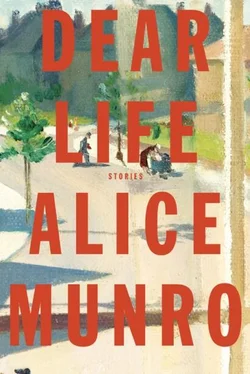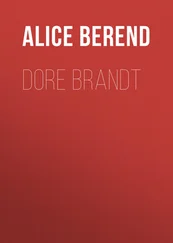Another problem might be that though he is a reticent sort of man, the poem that he is best known for is what people around here—that is, where he grew up—are apt to call raw. Pretty raw, I have heard him say himself, not apologizing but just maybe warning somebody off. He has a feeling for the sensibilities of those people he knows who can be upset by certain things, though he is a great defender of freedom of speech in general.
Not that there haven’t been changes around here, concerning what you can say out loud and read in print. Prizes help, and being mentioned in the papers.
All the years that I taught in a high school I didn’t teach literature, as you might expect, but mathematics. Then staying home I grew restless and undertook something else—writing tidy and I hope entertaining biographies of Canadian novelists who have been undeservedly forgotten or have never received proper attention. I don’t think I would have got the job if it wasn’t for Franklin, and the literary reputation that we don’t talk about—I was born in Scotland and really didn’t know any Canadian writers.
I never would have counted Franklin or any poet as deserving of the sympathy I gave the novelists, I mean for their faded or even vanished condition. I don’t know exactly why. Perhaps I think poetry is more of an end in itself.
I liked the work, I thought it worthwhile, and after years in classrooms I was glad of the control and the quiet. But there might come a time, say around four in the afternoon, when I just wanted to relax and have some company.
And it was around that time on a dreary closed-in day when a woman came to my door with a load of cosmetics. At any other time I wouldn’t have been glad to see her, but I was then. Her name was Gwen, and she said she hadn’t called on me before because they had told her I wasn’t the type.
“Whatever that is,” she said. “But anyway I had the idea, just let her speak for herself, all she has to do is say no.”
I asked her if she would like a cup of the coffee I had just made and she said sure.
She said she was just getting ready anyway to pack it in. She set her burdens down with a groan.
“You don’t wear makeup. I wouldn’t wear none neither if I wasn’t in the business.”
If she had not told me that, I would have thought her face was as bare as mine. Bare, sallow, and with an amazing nest of wrinkles round the mouth. Glasses that magnified her eyes, which were the lightest blue. The only blatant thing about her was brassy thin hair cut straight across her forehead in bangs.
Maybe it had made her uneasy, to be asked in. She kept taking jumpy little looks around.
“It’s bad cold today,” she said.
And then in a rush, “I don’t see any kind of an ashtray around here, do I?”
I found one in a cupboard. She got out her cigarettes and sank back in relief.
“You don’t smoke?”
“I used to.”
“Didn’t everybody.”
I poured her coffee.
“Black,” she said. “Oh, isn’t this the great stuff? I hope I didn’t interrupt whatever you were doing. You writing letters?”
And I found myself telling her about the neglected writers, even naming the one I was working on at the moment. Martha Ostenso, who wrote a book called Wild Geese and a horde of others all now forgotten.
“You mean like all this stuff will get printed? Like in the paper?”
In a book, I said. She exhaled somewhat dubiously, and I realized that I wanted to tell her something more interesting.
“Her husband is supposed to have written parts of the novel, but the odd thing is his name isn’t anywhere on it.”
“Maybe he didn’t want the guys to kid him,” she said. “Like, you know, what are they going to think about the kind of guy writes books.”
“I hadn’t thought of that.”
“But he wouldn’t mind taking the money,” she said. “You know men.”
Then she began to smile and shake her head and said, “You must be one smart person. Wait till I get to tell them at home that I saw a book that was just getting written.”
To take her off the subject, which had begun to embarrass me, I asked who were those at home.
Various people whom I didn’t get straight, or maybe didn’t bother to. I’m not sure about the order in which they were mentioned except that her husband was the final one and he was dead.
“Last year. Except he wasn’t my husband officially. You know.”
“Mine wasn’t either,” I said. “Isn’t, I mean.”
“Is that right? There’s so many doing that now, isn’t there? It used to be, oh my, isn’t it awful, and now it’s just, what the hell? And then there’s the ones that live together year after year and finally it’s, oh, we’re getting married. You think then, whatever for? For the presents, is it, or just the thought of getting dolled up in the white dress. Makes you laugh, I could die.”
She said she had a daughter who went through the whole fancy-dancy that way and much good it did her because she was now in jail for trafficking. Stupid. It was the man she went and married that got her into it. So now it was necessary to sell cosmetics as well as look after the daughter’s two young children, who had nobody else.
All the time she was telling me this she seemed in high good humor. It was when she got onto the subject of another quite successful daughter, a registered nurse who was retired and living in Vancouver, that she became dubious and a little fretful.
This daughter wanted her mother to ditch the whole lot of them and come and live with her.
“But I don’t like Vancouver. Everybody else does, I know. Just don’t like it.”
No. The trouble was, really, if she went to live with that daughter, she would have to quit smoking. It wasn’t Vancouver, it was the giving up smoking.
I paid for some lotion that would restore my youth and she promised to drop it off next time she came around.
I told Franklin all about her. Gwen, her name was.
“It’s another world. I rather enjoyed it,” I said. Then I didn’t quite like myself for saying that.
He said that maybe I needed to get out more, and should put my name in for some supply teaching.
When she came by soon with the lotion, I was surprised. After all I had already paid. She didn’t even try to sell me anything more, which seemed almost a relief to her, not a tactic. I made coffee again, and we talked easily, even in a rush, as before. I gave her the copy of Wild Geese that I had been using to write about Martha Ostenso. I said she could keep it, because I would be getting another one when the series came out.
She said she would read it. No matter what. She didn’t know when she had ever read a book through because of being so busy, but this time she promised.
She said she had never met a person like me, that was so educated and so easy. I felt a little flattered, yet cautious at the same time, as you feel when you realize that some student has a crush on you. Then there was embarrassment, as if I had no right to be so superior.
It was dark when she went out to start her car, and she couldn’t get it going. She tried again and again and the engine made a willing noise, then stopped. When Franklin came into the yard and couldn’t get past it I hurried to tell him the trouble. She got out of the driver’s seat when she saw him coming, and began to explain, saying it had been acting up on her like the devil lately.
He tried to get it going, while we stood by his truck, out of the way. He couldn’t manage it either. He went inside to call the garage in the village. She didn’t want to go in again, though it was cold out. The presence of the man of the house seemed to have made her reticent. I waited with her. He came to the door to call to us that the garage was closed.
Читать дальше












